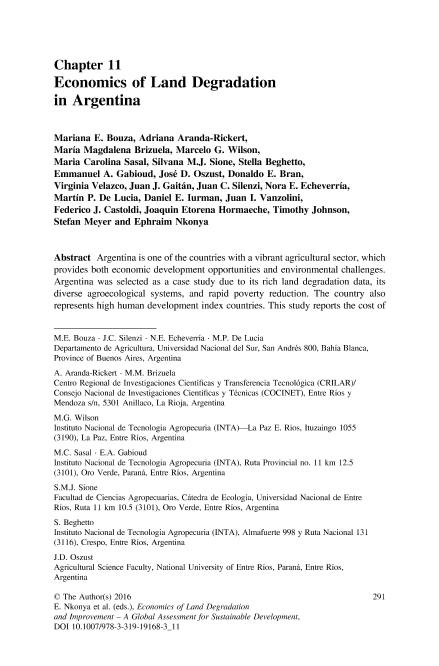Capítulo de Libro
Economics of land degradation in Argentina
Título del libro: Economics of Land Degradation and Improvement-A Global Assessment for Sustainable Development
Bouza, Mariana Eve; Aranda Rickert, Adriana Marina ; Brizuela, Maria Magdalena
; Brizuela, Maria Magdalena ; Wilson, Marcelo Germán
; Wilson, Marcelo Germán ; Sasal, Maria Carolina; Sione, Silvana; Beghetto, Stella; Gabioud, Emmanuel Adrián; Oszust, José Daniel; Bran, Donaldo Eduardo; Velazco, Virginia; Gaitán, Juan José
; Sasal, Maria Carolina; Sione, Silvana; Beghetto, Stella; Gabioud, Emmanuel Adrián; Oszust, José Daniel; Bran, Donaldo Eduardo; Velazco, Virginia; Gaitán, Juan José ; Silenzi, Juan Carlos; Echeverría, Nora Elena; de Lucia, Martín Pascual; Iurman, Daniel Eduardo; Vanzolini, Juan; Castoldi, Federico José; Hormaeche, Joaquin Etorena; Johnson, Timothy; Meyer, Stefan; Nkonya, Ephraim
; Silenzi, Juan Carlos; Echeverría, Nora Elena; de Lucia, Martín Pascual; Iurman, Daniel Eduardo; Vanzolini, Juan; Castoldi, Federico José; Hormaeche, Joaquin Etorena; Johnson, Timothy; Meyer, Stefan; Nkonya, Ephraim
 ; Brizuela, Maria Magdalena
; Brizuela, Maria Magdalena ; Wilson, Marcelo Germán
; Wilson, Marcelo Germán ; Sasal, Maria Carolina; Sione, Silvana; Beghetto, Stella; Gabioud, Emmanuel Adrián; Oszust, José Daniel; Bran, Donaldo Eduardo; Velazco, Virginia; Gaitán, Juan José
; Sasal, Maria Carolina; Sione, Silvana; Beghetto, Stella; Gabioud, Emmanuel Adrián; Oszust, José Daniel; Bran, Donaldo Eduardo; Velazco, Virginia; Gaitán, Juan José ; Silenzi, Juan Carlos; Echeverría, Nora Elena; de Lucia, Martín Pascual; Iurman, Daniel Eduardo; Vanzolini, Juan; Castoldi, Federico José; Hormaeche, Joaquin Etorena; Johnson, Timothy; Meyer, Stefan; Nkonya, Ephraim
; Silenzi, Juan Carlos; Echeverría, Nora Elena; de Lucia, Martín Pascual; Iurman, Daniel Eduardo; Vanzolini, Juan; Castoldi, Federico José; Hormaeche, Joaquin Etorena; Johnson, Timothy; Meyer, Stefan; Nkonya, Ephraim
Fecha de publicación:
2015
Editorial:
Springer
ISBN:
978-3-319-19167-6
Idioma:
Inglés
Clasificación temática:
Resumen
Argentina is one of the countries with a vibrant agricultural sector, which provides both economic development opportunities and environmental challenges. Argentina was selected as a case study due to its rich land degradation data, its diverse agroecological systems, and rapid poverty reduction. The country also represents high human development index countries. This study reports the cost of land degradation, the cost of inaction and cost and benefits of taking action against land degradation. The total loss of ecosystem services due to land-use/cover change (LUCC), wetlands degradation and use of land degrading management practices on grazing lands and selected croplands is about 2007 US$75 billion, which is about 16 %of the country’s GDP. LUCC accounts for 94 % of the loss, underscoring the need for developing more effective land use planning and incentives land users to protect high value biomes. The returns to taking action against land degradation is about US$4 per US$ invested—justifying the need to take action to improve human welfare and environmental protection. The actions against land degradation include investment in restoration of degraded lands and prevention of land degradation through stricter regulation of agricultural expansion into forests and other higher value biomes. They also include reforestation and other restoration efforts; protection wetlands and restoration of degraded wetlands. The excessive use of agrochemicals also require action to regulate their potential off-site effects. Case studies also show that promotion of rotational grazing, extending conservation agriculture beyond soybean; tillage method and crop-livestock production systems offer promising strategies for addressing land degradation. The world has a lot to learn from Argentina—given its rapid poverty reduction and successful adoption rate of conservation agriculture using public-private partnership. If Argentina aims at maintaining its economic and social development, it will need to work harder to address its growth-related environmental challenges that affect the poor the most. Argentina is better prepared to face these challenges. This study will contribute to informing policy makers on the best strategies for taking action against land degradation and the returns to such actions.
Palabras clave:
ARGENTINA
,
LAND DEGRADATION
,
LAND USE COVER CHANGE
,
WETLANDS
,
CROPLAND
Archivos asociados
Licencia
Identificadores
Colecciones
Capítulos de libros(CRILAR)
Capítulos de libros de CENTRO REGIONAL DE INV. CIENTIFICAS Y TRANSFERENCIA TECNOLOGICA DE ANILLACO
Capítulos de libros de CENTRO REGIONAL DE INV. CIENTIFICAS Y TRANSFERENCIA TECNOLOGICA DE ANILLACO
Citación
Bouza, Mariana Eve; Aranda Rickert, Adriana Marina; Brizuela, Maria Magdalena; Wilson, Marcelo Germán; Sasal, Maria Carolina; et al.; Economics of land degradation in Argentina; Springer; 18; 2015; 291-326
Compartir



